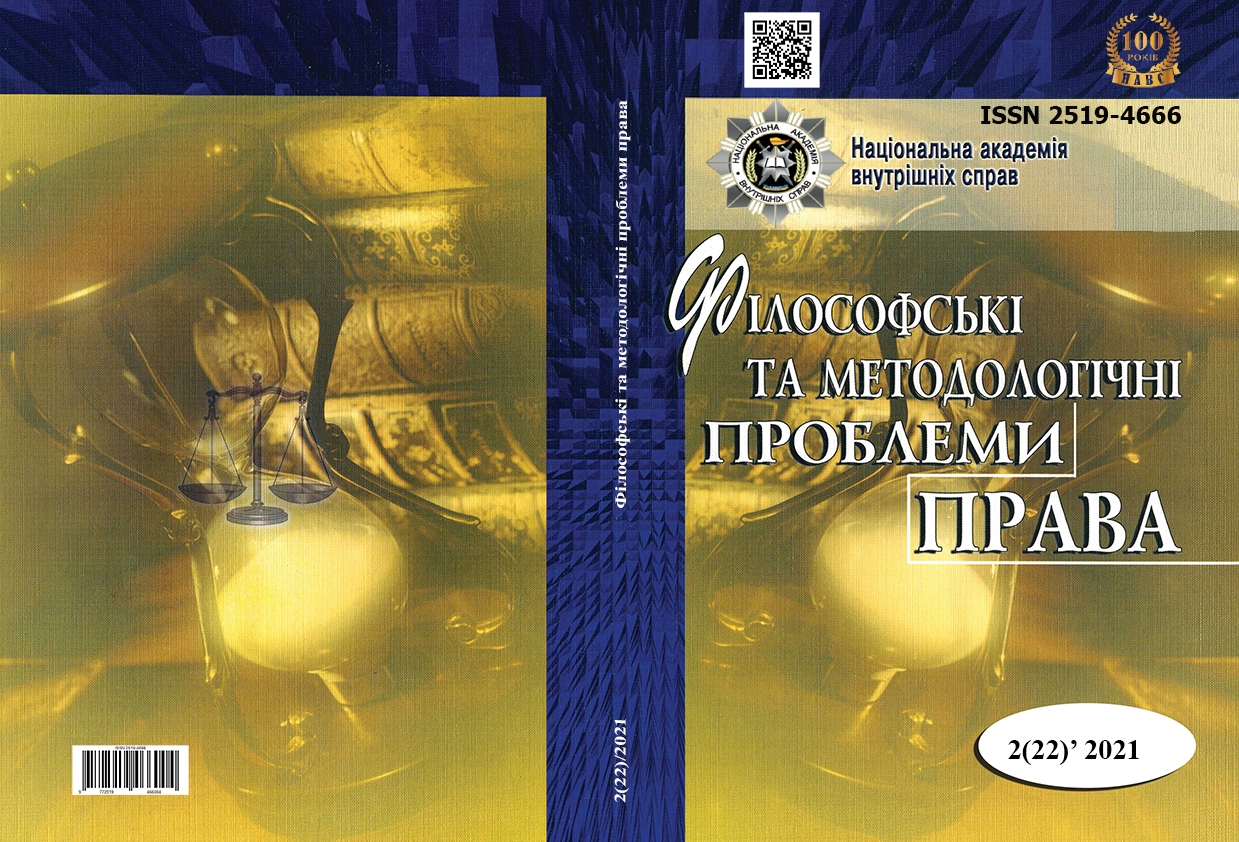The Mental Element Criminal liability for Illicit Enrichment
Abstract
The purpose of the article is to research methodological approaches to the establishment of criminal liability for illicit enrichment. The methods of scientific research are to characterize of different levels of complexity and to prove the necessity of their complex use for research of the problem. The methodological basis of the study is a set of methods of scientific research: historical, comparative law, descriptive, system-structural, dogmatic, sociological and modeling method. The study also used other methods of scientific research: the method of analysis of vocabulary definitions, formal-legal, as well as the method of induction and deduction. Scientific novelty. The author’s methodological approach to the research is offered of criminal liability for illicit enrichment which could be important for further research in this way. According to the results of the conducted research, the following conclusions have been formulated that the choice of method is important to clarify the scientific and theoretical foundations of any research. It was proposed that in the context of methodological research the establishment of criminal liability for illicit enrichment: 1) historical method provides an opportunity to get the patterns of criminal liability for illicit enrichment at different stages of historical development of the state; 2) comparative law method allows taking into account the international experience of foreign countries to suggest ways to improve; 3) descriptive method is used for qualitative characterization of the subject of a criminal offense; 4) the system-structural method makes it possible to shed light on the internal constructions of norms; 5) dogmatic method helps to identify shortcomings and explore ways to improve the criminal law of illicit enrichment; 6) sociological method is needed to analyze social conditions, phenomena and factors; 7) the modeling method is designed to formulate proposals to the legislation of Ukraine; 8) method of analysis of dictionary definitions for in-depth analysis of individual concepts; 9) the formal-legal method is used within the comparison of the norms of the current criminal legislation and the draft laws of Ukraine;
10) the induction method is used to obtain a general conclusion; 11) the method of deduction is used in the separation and characterization of the criteria for differentiation of criminal liability for illicit enrichment.
Keywords: methodology; method; illicit enrichment; criminal offence.
Downloads
References
Безгинський Б. Г. Об’єктивна сторона складу кримінального правопорушення незаконного збагачення. Юридичний часопис Національної академії внутрішніх справ. 2021. № 1 (21). С. 55–61. doi: https://doi.org/10.33270/04212101.55.
Бондаренко О. С. Предмет злочинів у сфері службової діяльності та професійної діяльності, пов’язаної з наданням публічних послуг : дис. …. канд. юрид. наук : 12.00.08. Київ, 2016. 242 с.
Гуторов Н. О. Методологічні засади дослідження проблем Особливої частини кримінального права. Проблеми боротьби зі злочинністю. 2009. № 100. С. 291–304.
Керимов Д. А. Методология права (предмет, функции, проблемы философии права) : монография. 2-е изд. М. : Аванта, 2001. 560 с.
Хилюк С. В. Розвиток науки кримінального права України після відновлення її державної незалежності (питання Особливої частини) : дис. ... канд. юрид. наук : 12.00.08. Львів, 2007. 304 с.
Костицький М. В., Кушакова-Костицька Н. В. Діалектика права як загальне вчення про право. Філософські та методологічні проблеми права. 2014. № 2. С. 208–213. URL: http://nbuv.gov.ua/UJRN/Fmpp_2014_2_20.
Панов М. І. Вибрані наукові праці з проблем правознавства. Київ : Ін Юре, 2010. 812 с.
Стеченко Д. М., Чмир О. С. Методологія наукового дослідження : підручник. 2-ге вид., переробл. і доповн. Київ : Знання, 2007. 317 с.
Туляков В. О. Порівняльний метод у науці кримінального права. Вісник Асоціації кримінального права України. 2014. № 1 (2). С. 29–40.
Abstract views: 315 PDF Downloads: 641
Copyright (c) 2022 Philosophical and Methodological Problems of Law

This work is licensed under a Creative Commons Attribution-NonCommercial-NoDerivatives 4.0 International License.
- Authors reserve the right to authorship of their own work and transfer to the magazine the right of the first publication of this work under the terms of the Creative Commons Attribution License, which allows other persons to freely distribute published work with mandatory reference to authors of the original work and the first publication of an article in this magazine.
- Authors have the right to enter into separate additional agreements on non-exclusive dissemination of the work in the form in which it was published in the journal (for example, to post an article in the institution's repository or to publish as part of a monograph), provided that the link to the first publication of the work in this journal is maintained.
- The journal's policy allows and encourages the posting of articles by authors on the Internet (for example, in electronic storehouses of institutions or on personal websites), both before the submission of this manuscript to the editorial office and during its editorial processing, as this contributes to the creation of a productive scientific discussion and positively affects the efficiency and dynamics of citing the published work.




